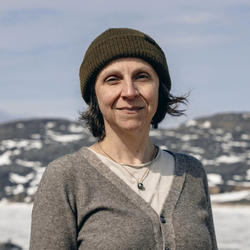Laurie Brewer

In addition to her work in the Textiles department, Laurie Anne Brewer also serves as a lecturer and critic in the Apparel Design and Theory and History of Art and Design departments. Her courses include The Uses of Animals in Relation to the Industry of Man: Design and Nature, 1851 and Now, Global Fashion and Baa Ram Ewe: Fiber Tales and Pathways.
Brewer previously worked in the department of textiles at the Museum at Fashion Institute of Technology (1998–2001) and the costume and textiles department at the RISD Museum (2007–24). She holds a BA in human ecology from the College of the Atlantic and an MA in museum studies: costume and textile history from the Fashion Institute of Technology. Her research often explores the intersections of nature and art, focusing on the ecology of fashion from the 19th century to the present day.
At the RISD Museum her exhibitions and research projects included Textile Printing with Paper Stencils in Japan-Ise katagami (2023–24), The Art and Design of Spider Silk (2019), Luminous Lace: Metallic Trims 1500-Now (2016), Golden Glamour: The Edith Stuyvesant Gerry Collection (2015), Indische Style: Batiks for the International Market (2015) and Queen of the Insects: The Art of the Butterfly (2009–10).
In addition to her curatorial and teaching practices, she is an avid fiber processor/hand spinner, knitter and papermaker.